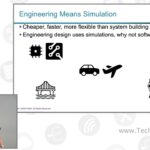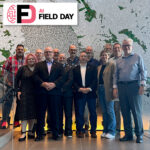|
|

Andy Banta presented for Ignite at AIFD5 |
This video is part of the appearance, “Ignite Talks at AI Field Day 5“. It was recorded as part of AI Field Day 5 at 9:00-10:00 on September 12, 2024.
Watch on YouTube
Watch on Vimeo
Andy Banta’s talk at AI Field Day 5 delves into the concept of CXL (Compute Express Link) and its potential to revolutionize memory access in computing architectures. He begins by explaining the traditional concept of Non-Uniform Memory Access (Numa), where memory access times vary depending on the proximity of the memory to the processor. CXL extends this idea by allowing memory to be connected via a CXL channel, which operates over a PCI-E bus, rather than the traditional DDR channel. This innovation enables memory to be located both inside and outside the physical box, and even connected through future CXL switches, which will allow shared memory access among multiple hosts. The potential for CXL to incorporate SSDs means that memory access times could range from nanoseconds to milliseconds, offering a wide array of possibilities for memory management.
Banta highlights the current limitations in testing CXL devices, noting that many are still in the conceptual phase and not readily available for purchase or testing. He draws an analogy to test-driving a car, where certain limitations prevent a thorough evaluation of the vehicle’s performance. Similarly, with CXL, the lack of commercially available switches and the ongoing development of standards for shared switches make it challenging to conduct meaningful tests. To address this, Banta proposes a simulation-based approach, akin to practices in other engineering disciplines like electrical or mechanical engineering. He suggests that software engineering and system design should also adopt simulation to evaluate different configurations and workloads, thereby optimizing performance and resource allocation.
Banta introduces Magnition, a company he is consulting with, which has developed a large-scale simulation framework for CXL environments. This framework allows for distributed, multi-processor simulations of various components, enabling users to run genuine applications and workloads to capture memory access patterns. By simulating different configurations and workloads, Magnition’s framework can help identify optimal memory allocation strategies and performance sweet spots. Banta emphasizes the importance of consistent results in performance engineering and demonstrates how their simulation framework can achieve this by running controlled experiments. The ultimate goal is to provide a reliable and efficient way to “test drive” CXL systems, ensuring that users can make informed decisions about their memory management strategies.
Personnel: Andy Banta









